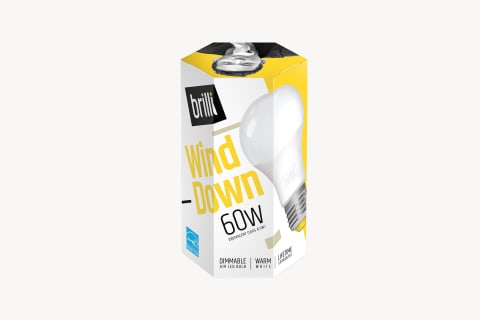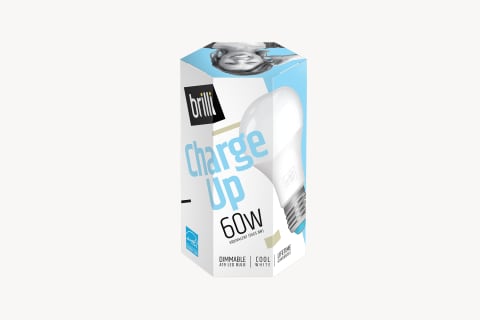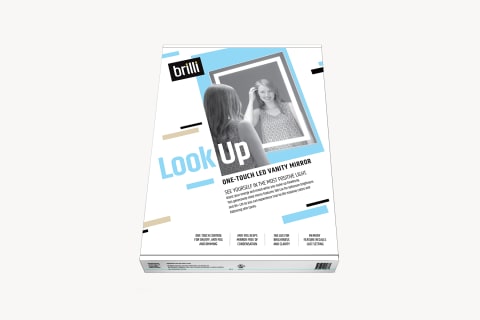Advertisement
The Invisible Ways Indoor Light Is Messing With Your Health

Ever spend all day working in an office with terrible overhead lighting and thought, there's no way this can be good for my productivity, mood, mental health, etc.? Well, you're not wrong.
The thing is, it's not just the bad lighting at work that has an effect on all these things—it's often the lighting in our own homes, too. And it's all thanks to a single explanation: "Light is the strongest cue for setting the timing for our biological clock, which regulates the timing of our circadian rhythms," says Shadab A. Rahman, Ph.D., MPH, an instructor in medicine at Harvard Medical School whose research encompasses circadian neurophysiology. "Our energy, alertness, mood, and sleep all have circadian rhythms."
In other words, the lighting around us has the power to throw entire aspects of our well-being out of whack.
A light-bulb moment: Our modern indoor lifestyles changed everything.
As humans, we've spent "thousands of generations living and growing under natural environmental conditions," says neuroscientist Doug Steel, Ph.D. "Our bodies function and respond in synchrony to the natural patterns of the planet, specifically the sun rising and setting each day." We've evolved so that the photoreceptors in our eyes detect light not just for the process of vision but also for our circadian rhythm1, which cues up a number of systems in the body.
We get very little light during the day and too much light at night, compared to the natural conditions we have evolved to.
But with the invention of the light-bulb and the gradual shift to spending more than 90% of our lives indoors2, we've disrupted the way our bodies have naturally depended on the sun for healthy circadian rhythms. "Most of us spend our days indoors with little exposure to outdoor natural light," Rahman says. Indoor electrical lighting, according to Rahman, is about 100 to 1,000 times dimmer than sunlight, and 100 to 1,000 times brighter than being out in nature at night.
"Consequently, we get very little light during the day and too much light at night, compared to the natural conditions we have evolved to," he says. "We have to control our light exposure appropriately in line with our physiology so we don't induce unwanted or unhealthy responses."
How to get our lighting right.
This means that many of us may be in dire need of a circadian reset. Thankfully, we can reset our biological clock for healthier and optimal functioning by just being exposed to the proper kind of light at the right time of day. "There are two critical times of day," says Steel, "early morning when you first wake up, and the last two hours of the evening before you go to bed. If you get these two right, everything else pretty much falls into place." Read on for three expert-backed tips for getting lighting right:
Early morning to afternoon.
If you can, "wake up around the same time every day, weekdays and weekends," says Rahman, and when you do, get bright light exposure ASAP upon waking, then continue bright light exposure until early evening.
"In the early morning, you want to wake up to either full-spectrum daylight, or use a light bulb that has a high proportion of high-quality blue light content," adds Steel. "Give yourself a strong exposure to bright light for at least 20 minutes to stimulate the release of cortisol, which perks you up for the rest of the day. While you may find such a bulb at a hardware store, there are a lot of cheap products out there that put out a poor quality of lightm and most people can't stand that for very long." (Hello, office overhead lights!)
Give yourself a strong exposure to bright light for at least 20 minutes to stimulate the release of cortisol.

"Brilli has designed the dimmable Charge Up light bulb to provide the correct quality and quantity of light that when used in the morning—and throughout the day—will provide the correct exposure necessary for circadian entrainment," says Steel. "The Brilli products have been engineered to have a very high quality of light, which means that they provide a very pleasant and enjoyable exposure that can be tolerated for long periods of time." Don't be surprised if you notice a natural uptick in alertness and productivity.
Just remember: "No manufactured lighting product is superior to natural daylight," Steel adds. "All of us should try to get outdoors and soak up some sunlight during the day. A walk outside in the morning is a perfect solution, but even just sitting outside for 30 to 45 minutes at lunchtime will not only contribute to daytime alertness but also the quality of the evening pre-bedtime experience as well."
Early evening to late night.
First, be proactive about winding down three to four hours before bedtime. Two to three hours before bed, reduce your bright light exposure, which suppresses the physiological drive for sleep by alerting our brain to stay awake. "Beginning about two hours before your desired bedtime, remove most of the light from your environment," says Steel. "This serves as a cue to the body that helps it start to prepare for sleep. It can be dimmed as desired, but [cutting out] the blue light content is the most important factor."
This is the perfect time to turn on the warm, dimmable Wind Down light bulbs by Brilli—a healthy, circadian-supporting solution for keeping on the lights at night—without keeping you up. These lights help you ease into evening relaxation and nudge your body into restful sleep.
Then, tuck away electronic devices with illuminated screens at least an hour before bedtime. While Wind Down goes great in your bedroom lamps, Brilli's Get in Sync Circadian LED Downlights are perfect for living rooms and kitchens. The Get in Sync lights can emulate both bright morning sunlight and soft, warm sunset light, so the inside of your home can better reflect the natural time of day outside. (And if you're looking for more options, Brilli has also tuned the light spectrum in their Look Up One-Touch Vanity Mirror to sync up with the natural light—perfect for bathrooms or above your bedroom vanity). After lights out, it's sweet dreams.




